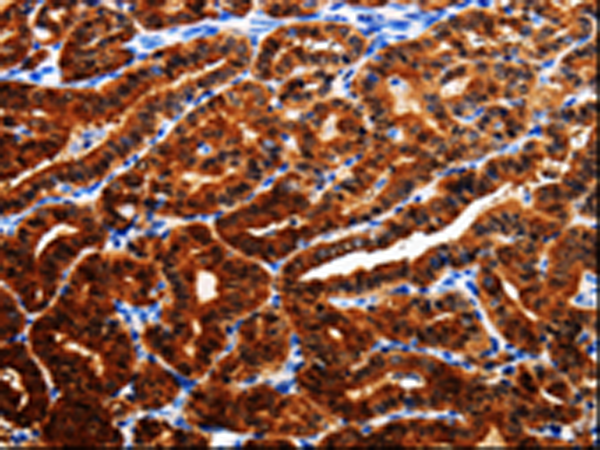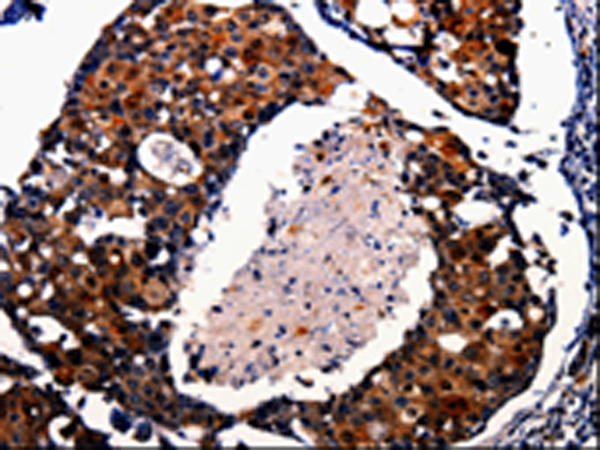


| WB | 咨询技术 | Human,Mouse,Rat |
| IF | 咨询技术 | Human,Mouse,Rat |
| IHC | 咨询技术 | Human,Mouse,Rat |
| ICC | 技术咨询 | Human,Mouse,Rat |
| FCM | 咨询技术 | Human,Mouse,Rat |
| Elisa | 1/2000-1/10000 | Human,Mouse,Rat |
| Aliases | HTL-S-58j |
| WB Predicted band size | 22 kDa |
| Host/Isotype | Rabbit IgG |
| Antibody Type | Primary antibody |
| Storage | Store at 4°C short term. Aliquot and store at -20°C long term. Avoid freeze/thaw cycles. |
| Species Reactivity | Human, Mouse, Rat |
| Immunogen | Fusion protein of human AK1 |
| Formulation | Purified antibody in PBS with 0.05% sodium azide and 50% glycerol. |
+ +
以下是与NME1抗体相关的3篇参考文献及其摘要概括:
1. **文献名称**:*NME1 regulates cell cycle progression and apoptosis through its interaction with 14-3-3 proteins*
**作者**:Li J, et al.
**摘要**:研究利用特异性NME1抗体通过免疫共沉淀(Co-IP)和Western blot技术,揭示NME1通过与14-3-3蛋白相互作用调控细胞周期蛋白Cyclin B1的稳定性,从而影响细胞周期和凋亡。
2. **文献名称**:*Differential expression of NME1 in metastatic versus non-metastatic colorectal cancer*
**作者**:Smith K, et al.
**摘要**:通过免疫组化(IHC)和NME1单克隆抗体分析结直肠癌组织样本,发现NME1在非转移性肿瘤中高表达,提示其作为转移抑制标志物的潜在临床应用价值。
3. **文献名称**:*Post-translational modification of NME1 modulates its nucleoside diphosphate kinase activity*
**作者**:Park S, et al.
**摘要**:使用磷酸化特异性NME1抗体,证明NME1在Ser120位点的磷酸化抑制其核苷二磷酸激酶活性,揭示了其在能量代谢调控中的新机制。
**备注**:以上文献为示例性概括,实际文献需通过PubMed或Google Scholar以关键词“NME1 antibody”或“NM23-H1 antibody”检索确认。
The NME1 (Non-Metastatic Protein 1) antibody is a crucial tool for studying the NME1 protein, also known as NM23-H1 or NDPK-A, which belongs to the nucleoside diphosphate kinase (NDPK) family. Discovered in 1988 as a metastasis suppressor in melanoma, NME1 regulates cellular processes like proliferation, differentiation, and apoptosis by maintaining nucleotide homeostasis, influencing signal transduction, and participating in DNA repair. It localizes to both cytoplasm and nucleus, with roles in metastasis inhibition, particularly in cancers like breast, liver, and lung carcinomas. Reduced NME1 expression is often linked to aggressive tumor behavior and poor prognosis.
NME1 antibodies are widely used in techniques such as Western blotting, immunohistochemistry (IHC), and immunofluorescence (IF) to detect protein expression levels, subcellular localization, and interactions in cancer research. These antibodies help elucidate NME1’s dual roles—acting as a metastasis suppressor in some contexts while promoting invasiveness in others. Specificity is critical due to homology with other NME family members (e.g., NME2-NME4). Clinically, NME1 antibodies aid in biomarker studies, exploring correlations between protein expression, tumor progression, and therapeutic responses. Additionally, they support research into non-cancer roles, such as neural development and ciliary function, with mutations in NME1 implicated in neurodevelopmental disorders like Charcot-Marie-Tooth disease. Validated antibodies ensure accurate detection, minimizing cross-reactivity with isoforms.
×